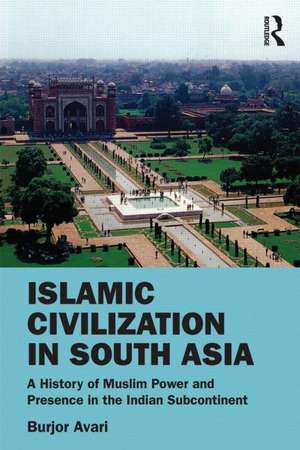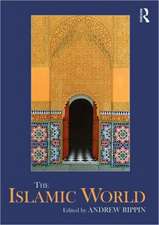Islamic Civilization in South Asia: A History of Muslim Power and Presence in the Indian Subcontinent
Autor Burjor Avarien Limba Engleză Paperback – 16 noi 2012
Using a chronological framework, the book discusses the main events in each period between c. 600 CE and the present day, along with the key social and cultural themes. It discusses a range of topics, including:
- How power was secured, and how was it exercised
- The crisis of confidence caused by the arrival of the West in the sub-continent
- How the Indo-Islamic synthesis in various facets of life and culture came about
| Toate formatele și edițiile | Preț | Express |
|---|---|---|
| Paperback (1) | 492.86 lei 6-8 săpt. | |
| Taylor & Francis – 16 noi 2012 | 492.86 lei 6-8 săpt. | |
| Hardback (1) | 1231.21 lei 6-8 săpt. | |
| Taylor & Francis – 16 noi 2012 | 1231.21 lei 6-8 săpt. |
Preț: 492.86 lei
Nou
Puncte Express: 739
Preț estimativ în valută:
94.35€ • 97.09$ • 79.53£
94.35€ • 97.09$ • 79.53£
Carte tipărită la comandă
Livrare economică 28 februarie-14 martie
Preluare comenzi: 021 569.72.76
Specificații
ISBN-13: 9780415580625
ISBN-10: 0415580625
Pagini: 348
Ilustrații: 34 black & white illustrations, 23 black & white halftones, 11 black & white line drawings
Dimensiuni: 156 x 234 x 18 mm
Greutate: 0.54 kg
Ediția:New.
Editura: Taylor & Francis
Colecția Routledge
Locul publicării:Oxford, United Kingdom
ISBN-10: 0415580625
Pagini: 348
Ilustrații: 34 black & white illustrations, 23 black & white halftones, 11 black & white line drawings
Dimensiuni: 156 x 234 x 18 mm
Greutate: 0.54 kg
Ediția:New.
Editura: Taylor & Francis
Colecția Routledge
Locul publicării:Oxford, United Kingdom
Cuprins
1. Introduction 2. The Era of Arab Predominance 3. Turkish Power and Persian Culture in the Age of Transition 4. The Delhi Sultanate at its Zenith 5. New Centres of Muslim Power and Culture 6. The Mughal Ascendancy: Akbar and his Successors 7. The Age of Mughal Disintegration 8. Muslims under the East India Company 9. Stirrings of a Muslim Modernity under the Raj 10. Unity or Separatism? Muslim Dilemma at the End of the Raj 11. Epilogue: New Challenges in a Fractured Subcontinent
Notă biografică
Burjor Avari is Honorary Research Fellow at Manchester Metropolitan University, UK. His research interests include Indian and South Asian History, and he is the author of India: The Ancient Past – The History of the Indian Subcontinent from 7000 BC to AD 1200 (Routledge, 2007).
Recenzii
"…..the author’s story is extremely well-told – This will be a most accessible book, and most pleasingly his exposition, working over some heavily contested areas of history, is very well-balanced".
Francis Robinson, Royal Holloway, University of London, UK
Islamic Civilization in South Asia presents a solid account of Muslim power and presence in the Indian subcontinent. The book’s strength lies in its probing analysis of the political and socio-economic aspects of Indo-Muslim history, and will help students of South Asian Islam interrogate the relationship between power and knowledge and the political dimensions of cultural forms.
Ali Altaf Mian Duke University, US
Islamic Civilization in South Asia presents a solid account of Muslim power and presence in the Indian subcontinent. The book’s strength lies in its probing analysis of the political and socio-economic aspects of Indo-Muslim history, and will help students of South Asian Islam interrogate the relationship between power and knowledge and the political dimensions of cultural forms.
Ali Altaf Mian Duke University, US
Descriere
Muslims have been present in South Asia for 14 centuries. Nearly 40% of the people of this vast land mass follow the religion of Islam, and Muslim contribution to the cultural heritage of the sub-continent has been extensive. This textbook provides both undergraduate and postgraduate students, as well as the general reader, with a comprehensive account of the history of Islam in India, encompassing political, socio-economic, cultural and intellectual aspects.










